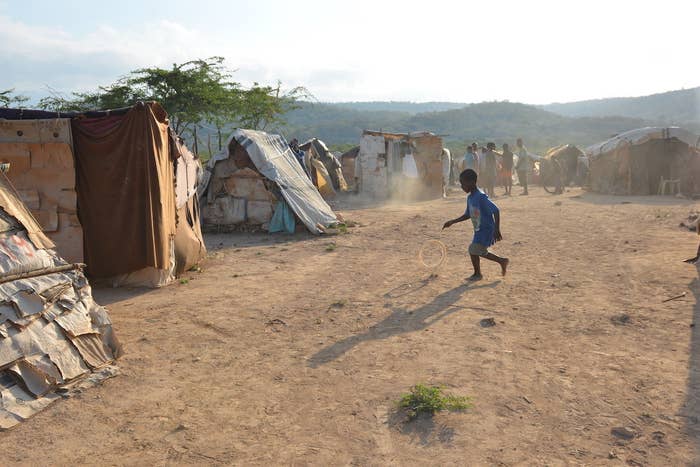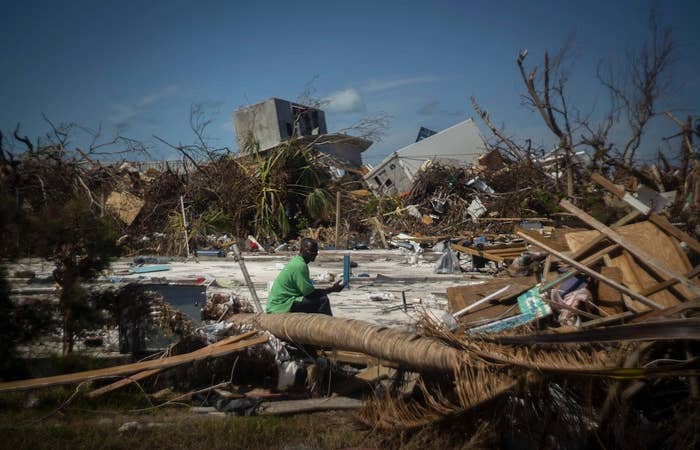The letter puts more pressure on President Joe Biden at a time when Haiti faces increased political instability and higher rates of kidnapping and violent crime.
BUZZFEED Posted on March 12, 2021,

Dave Mcfadden / AP
A boy plays with a discarded tire at a borderland encampment outside the southeast Haitian town of Anse-à-Pitres, Haiti.
Democratic Sen. Robert Menendez and his Republican colleague, Marco Rubio, called on the Biden administration Friday to issue a new round of deportation protections for Haitian immigrants in the US due to the deteriorating situation in their home country, according to a letter obtained by BuzzFeed News.
The senators want a new round of Temporary Protected Status protections for Haitians in the US. The letter puts more pressure on President Joe Biden at a time when Haiti faces increased political instability and higher rates of kidnapping and violent crime.
“We write to express our deep concern about the complicated economic, security, and humanitarian challenges in Haiti and respectfully request that you consider redesignating Haiti for Temporary Protected Status (TPS). Haiti’s protracted political crisis exacerbates the severe and prolonged humanitarian needs sparked by the 2010 earthquake,” the senators wrote in a letter intended for Department of Homeland Security Secretary Alejandro Mayorkas. “While the Government of Haiti has been able to receive limited numbers of Haitian nationals removed from the United States, it lacks the capacity to provide the needed reception and care for tens of thousands of returnees.”

Ramon Espinosa / AP
A Haitian immigrant sits on the remains of what was used to be a house in a
neighborhood destroyed by Hurricane Dorian, in Abaco, Bahamas, in September 2019.
Such a redesignation would expand the pool of Haitians in the US eligible for the TPS program.
BuzzFeed News previously reported that DHS officials acknowledged in an internal report that “based on a recent analysis of conditions in Haiti, USCIS believes that Haitians removed to Haiti may face harm upon return to Haiti as follows.”
The DHS document goes on to explain the conditions in the country and relies exclusively on publicly available information, including a State Department travel advisory from August that recommended not traveling to Haiti due to “crime, civil unrest, kidnapping, and COVID-19.”
The travel advisory explained that kidnapping and violent crime, including armed robbery, was widespread, and that local police may lack the resources to help. The DHS document cited an InSight Crime report from July that the Haitian government was using gangs to “repress the opposition.”
Voice of America also reported that a UN official said this week that half the Haitian population needed humanitarian assistance.
The situation in Haiti has further deteriorated in recent months, according to the DHS report, which documents how Haitian President Jovenel Moïse has been ruling without a legislative body since January 2020 and that there are concerns he is becoming “increasingly authoritarian as he relies on executive decrees to accomplish his agenda.” Meanwhile, protests have rocked the country, and the government has “employed violence” against demonstrators, according to the report.
The Obama administration previously provided temporary protected status for Haitians who had been in the US continuously since 2010 after an earthquake hit near the capital of Port-au-Prince and more than 200,000 people were estimated to have been killed. Those who are granted TPS are also given work permits.
The Trump administration sought to undo the temporary protected status — an administration official even pressed colleagues for research documenting criminal activity of Haitians in the US — as part of its efforts to restrict immigration. The plans, however, were later scuttled after federal court decisions.
Last year, a federal appeals court finally allowed the Trump administration to move forward with their plans to cut the protections, but in December, DHS extended the TPS status for roughly 50,000 people who already had it until October.
“As the United States engages with the Haitian government to help chart a way forward, a TPS redesignation would provide a much-needed reprieve for upwards of 55,000 Haitians in the United States, including current Haitian TPS beneficiaries,” Rubio and Menendez wrote. “It would also lessen the burden on the Haitian people, government, and aid organizations, and mitigate risks of further destabilization.”
DHS officials did not immediately respond to a request for comment.
Immigrant advocates have increasingly called on the Biden administration to scale back deportations and turn-backs of Haitians at the border.
“Increasing political and societal violence in Haiti is placing the lives of thousands of Haitians at risk. It is no surprise that many are fleeing for their lives. Rather, what is surprising is that the United States has ramped up deportations at the same time that conditions have become more dangerous,” said Sunil Varghese, policy director at the International Refugee Assistance Project. “Redesignation of TPS for Haiti is an immediate and important step the administration needs to take to protect lives now.”
Such a redesignation would expand the pool of Haitians in the US eligible for the TPS program.
BuzzFeed News previously reported that DHS officials acknowledged in an internal report that “based on a recent analysis of conditions in Haiti, USCIS believes that Haitians removed to Haiti may face harm upon return to Haiti as follows.”
The DHS document goes on to explain the conditions in the country and relies exclusively on publicly available information, including a State Department travel advisory from August that recommended not traveling to Haiti due to “crime, civil unrest, kidnapping, and COVID-19.”
The travel advisory explained that kidnapping and violent crime, including armed robbery, was widespread, and that local police may lack the resources to help. The DHS document cited an InSight Crime report from July that the Haitian government was using gangs to “repress the opposition.”
Voice of America also reported that a UN official said this week that half the Haitian population needed humanitarian assistance.
The situation in Haiti has further deteriorated in recent months, according to the DHS report, which documents how Haitian President Jovenel Moïse has been ruling without a legislative body since January 2020 and that there are concerns he is becoming “increasingly authoritarian as he relies on executive decrees to accomplish his agenda.” Meanwhile, protests have rocked the country, and the government has “employed violence” against demonstrators, according to the report.
The Obama administration previously provided temporary protected status for Haitians who had been in the US continuously since 2010 after an earthquake hit near the capital of Port-au-Prince and more than 200,000 people were estimated to have been killed. Those who are granted TPS are also given work permits.
The Trump administration sought to undo the temporary protected status — an administration official even pressed colleagues for research documenting criminal activity of Haitians in the US — as part of its efforts to restrict immigration. The plans, however, were later scuttled after federal court decisions.
Last year, a federal appeals court finally allowed the Trump administration to move forward with their plans to cut the protections, but in December, DHS extended the TPS status for roughly 50,000 people who already had it until October.
“As the United States engages with the Haitian government to help chart a way forward, a TPS redesignation would provide a much-needed reprieve for upwards of 55,000 Haitians in the United States, including current Haitian TPS beneficiaries,” Rubio and Menendez wrote. “It would also lessen the burden on the Haitian people, government, and aid organizations, and mitigate risks of further destabilization.”
DHS officials did not immediately respond to a request for comment.
Immigrant advocates have increasingly called on the Biden administration to scale back deportations and turn-backs of Haitians at the border.
“Increasing political and societal violence in Haiti is placing the lives of thousands of Haitians at risk. It is no surprise that many are fleeing for their lives. Rather, what is surprising is that the United States has ramped up deportations at the same time that conditions have become more dangerous,” said Sunil Varghese, policy director at the International Refugee Assistance Project. “Redesignation of TPS for Haiti is an immediate and important step the administration needs to take to protect lives now.”

No comments:
Post a Comment